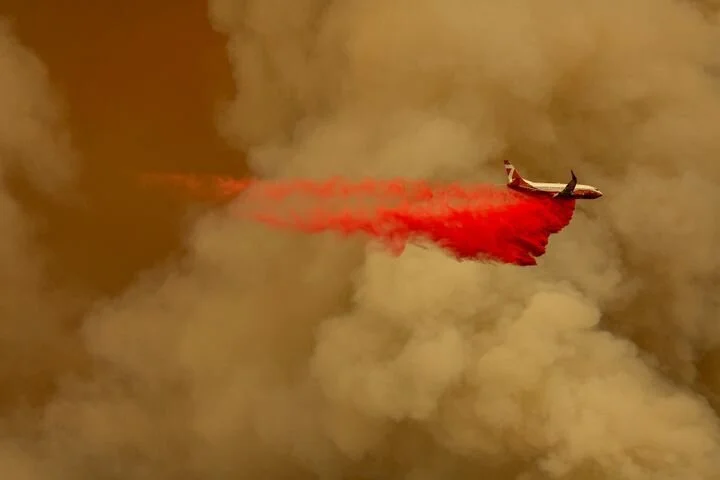At Miltecayotl, the essence of the milpa is more than just a name; it is a guiding principle. This January, we stood alongside farmworkers, the original macehualli of our sacred Mother Earth, to provide support through our Farmworkers’ Food Distribution program. On January 17, 2025, Miltecayotl distributed 191 boxes of food to 793 individuals across 17 different zip codes in Arizona. Each box, whether destined for a family of two or ten, was more than a collection of essentials—it was a testament to the resilience and dignity of the people we serve.
Read MoreAs we transition into a new season and year, I want to share an important update about my professional journey with the broader Tishman Center community.
I am thrilled to start a new role as the Resource Mobilization Officer at the Global Alliance for Incinerator Alternatives (GAIA), an organization I've known and admired for a long time. My work will focus on resourcing GAIA’s mission to catalyze a global shift toward environmental justice by strengthening grassroots social movements that advance waste and pollution solutions, working across the globe. In this role, I will continue my efforts to move philanthropic resources to be more justice-centered, equitable, and accessible to the broader climate and environmental justice movement. This career shift feels like a natural continuation of my work here, as GAIA’s values deeply align with those of the Tishman Center.
Read MoreThis important moment following the elections calls for our steadfast commitment and solidarity with our communities of practice and partners.
Read MoreIn light of recent disheartening news, the Supreme Court's decision to overturn the Chevron Doctrine—severely restricting the EPA and other federal agencies from protecting our environment and public health—it's essential to find and share stories of hope and resilience. One such story comes from Darryl Molina Sarmiento, the 2024-2026 EJ Disrupt Design Fellow and Executive Director of Communities for a Better Environment (CBE).
Read MoreThe Tishman Environment and Design Center invites you to join us on September 20 at 6:30 p.m. for our Keynote Climate Week Event, a dynamic panel discussion, at The New School.
Join Tishman’s Senior Fellow, Danielle Deane-Ryan, an equitable climate solutions expert and moderator of this critical conversation with esteemed panelists: Harold Mitchell from Regenesis Institute, Trenton Allen from Sustainable Capital Advisors, Maria Lopez-Nunez from Ironbound Community Corporation, Joe Evans from the Kresge Foundation, and Helen Chin from Communities First Fund; with remarks from Michelle DePass, the Tishman Center's Senior Advisor.
Read MoreRecently Dr. Ana Baptista, our Co-Director, attended a symposium with environmental justice (EJ) leaders to discuss industrial carbon removal strategies in the United States of America. There were representatives from a number of organizations, including the Deep South Center for Environmental Justice, the Hip Hop Caucus, WE ACT for Environmental Justice, and others. The result of the symposium was the statement that is below this message.
Read MoreThis year marks a pivotal moment for the Tishman Center in our nearly twenty-year history. We are very excited to announce that in December 2021, the Center was awarded a catalytic, multi-year grant to strengthen our operational, research, and communications capacity by Waverley Street Foundation. Our increased capacity will help us better meet the needs of our campus community, our Ripe for Creative Disruption Fellows, and our collaborative, action-based research.
Read MoreAs we are still in the midst of both a global pandemic that continues to affect the lives of everyone on the globe, multiple deadly conflicts in places such as Yemen, Syria, Ukraine and other locales, and the active stripping away of rights in the United States of America, we are glad to find inspiration and hope in the work of our student awardees. These students are dedicating time and effort to addressing not only environmental and climate injustice, but also advocating for democracy, civil rights, accessibility and methods to deal with trauma. We are proud to support the work of these amazing people and are happy to share their work with you. If you are interested in hearing more or want to further support their work, please feel free to reach out to us. And to all of the awardees, thank you for the time and commitment you put into your projects.
Read MoreThe Tishman Center led the effort to complete The New School’s AASHE STARS Certification for 2021. The process started at the beginning of 2021 and was managed by Tishman Center Assistant Director Mike Harrington along with critical support from Ali Sahin and Maryna Arabei, two Tishman Center Research Assistants. We are happy to report that the university retained a silver rating and a slightly higher score than our last assessment.
Read MoreThe U.N. Intergovernmental Panel on Climate Change’s Working Group II Sixth Assessment Report (IPCC WGII AR6) was released on February 28, 2022: a 3,675-page tome that focuses on climate “Impacts, Adaptation and Vulnerability”. Governments around the world use this report as the authority on how climate change impacts nature and humanity.
Read MoreIn 2016, the Tishman Environment and Design Center created student awards to help support the work of students doing research and projects around environmental and climate justice. We are thrilled to announce the Tishman Center’s 2021-2022 Student Award grantees, seven projects carried out by ten students who represent almost all of the colleges across the New School. These projects embody the transdisciplinary approach that both the university and the Tishman Center embrace as the best way to address the issues of our time.
Read MoreSince the 28th of July, there have been over 120 wildfires reported in the southwest region of Turkey in just a week (as of august 4th, 2021). Turkish authorities announced that several of the fires at those areas are under control but social media, videos and live footage from the affected villages across the shows that the majority of the southwest peninsula in the country is still burning and doesn’t seem to be on its way to stopping until the last tree is nothing but ashes.
Read MoreNew York faces severe challenges posed by climate change including dangerous heat waves and flooding from sea-level rise. The New York City Panel on Climate Change (NPCC), founded in 2009, is an independent group that assesses climate and environmental risks to NYC and recommends changes in an advisory report, much like the United Nations’ Intergovernmental Panel on Climate Change (IPCC) .
Read MoreThe last few decades have seen an exponential rise in the deployment of wind energy worldwide, mostly through the development of large-scale wind farms. Onshore wind is land-intensive: because wind energy is more dispersed than fossil fuel energy, it has significant spatial requirements, and with those requirements come an increasing number of conflicts—from the Americas to Asia, Africa, and Europe (Avila 2018). Two key features of these conflicts are pressures on land and patterns of uneven development, which create problems of space and justice (Avila 2018).
Read MoreAs Biden enters his presidency in the middle of a pandemic, many of his actions in the first two weeks have addressed COVID-19 and the economy. However, this has not stopped Biden from tackling the climate crisis. On his first day as President, Biden set a clear environmental priority by rejoining the Paris Climate Accord and cancelling the Keystone XL Pipeline. Moreover, he is prioritizing science in the political process and assembling a “Climate Cabinet”.
Most importantly, Biden recognizes that environmental justice is a vital part of the climate crisis. On his campaign trail, Biden proposed a 4-part Environmental Justice Plan. A week into his presidency, Biden released an Executive Order regarding the climate crisis, which included orders regarding environmental justice. When comparing the executive order against the plan, we found that Biden took action in each part of his environmental justice plan. The article compares how his actions have stacked up to his campaign promises so far.
Read MoreWe are in a pivotal moment where things once unimaginable are now undeniable. We can't continue to rely on technocratic approaches that have proven ineffective or that only make superficial change. To build a just world, we need people-centered strategies that challenge the political, social, and economic leaders and systems that produced decades of environmental racism and inaction on climate change. Environmental Justice Movement leaders, specifically the people who are closest to the dangers of climate change, should lead us in identifying solutions.
Read MoreThe Tishman Environment and Design Center at The New School has compiled state-specific reports for Florida, New York, Minnesota, Massachusetts, and Pennsylvania, the 5 states with the highest numbers of municipal solid waste incinerators. These waste incinerators have been known to emit mercury, lead, particulate matter 2.5 and 10, sulfur dioxide, nitrous oxide, and carbon monoxide, all of which pose significant dangers to public health. Eighty-one percent of these trash incinerators are located within environmental justice communities.
Read MoreAs news comes in about the upcoming elections, set against a backdrop of a pandemic, we are now also bearing witness to two natural disasters in the United States: horrifying fires on the West Coast have killed at least 33 people and displaced thousands of others and, although firefighters are now starting to make progress against several of the wildfires, the dry conditions could still change the course of this step towards controlling the situation.
Read MoreBefore we start, I want you to do a thought experiment. Think about the images you see on news coverage when there is a heat wave in a city (when it is about 95 F/ 35 C for a few days). What immediately comes to mind? Who do you picture?
Read MoreApril 24th marked the seventh anniversary of the Rana Plaza building collapse in Savar, Bangladesh. At least 1,134 people died in seconds when the building came down on them, while another 2,500 were injured. Most of the lost were garment workers, young women around the same age as the fashion students I teach at Parsons. Since then, each anniversary has been marked by Fashion Revolution, a grassroots campaign initiated by Orsola de Castro and Carry Somers. Numerous other initiatives were founded to support impacted workers and their families.
Read More



















